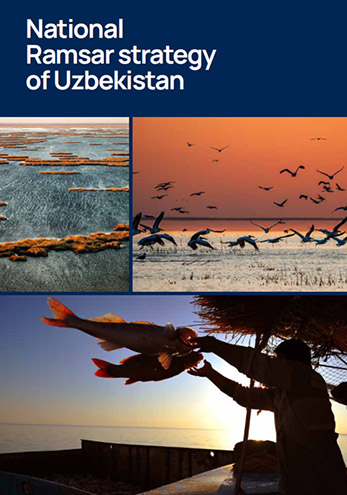No. 61 (585) July 2025
WORK MEETING ON THE NATIONAL RAMSAR STRATEGY OF UZBEKISTAN
On 8 July 2025, SIC ICWC represented by Ms Zulfiya Yarullina took part in discussion event on the draft National Ramsar Strategy of Uzbekistan, 2026-2030.

The meeting was organized by the Ministry of Ecology, Environmental Protection and Climate Change of Uzbekistan, with the support of the Succow Foundation. The event brought together leading experts from the Ministry of Ecology, Environmental Protection, and Climate Change, research institutes, NGOs, the IFAS Agency in Uzbekistan, and other relevant organizations.
The Convention on Wetlands of International Importance, especially as waterfowl habitat (Ramsar Convention), is an intergovernmental treaty providing the framework for the conservation and wise use of wetlands and their resources.
Uzbekistan became a Party to the Ramsar Convention in 2001, with the Convention entering into force for the country on February 8, 2002. This commitment obliges Uzbekistan to adhere to the Convention's main objectives: the conservation and wise use of all wetlands to achieve sustainable development. In 2020, Uzbekistan joined the Ramsar Regional Initiative for Central Asia.
Currently, the Ramsar List includes six wetland sites in Uzbekistan: Lake Dengizkul (October 8, 2001), Aidar-Arnasay Lake System (October 20, 2008), Tudakul and Kuyimazar Reservoirs (August 19, 2020), the Sudochye Lake System (May 30, 2022), and Lake Zhyltyrbas (August 8, 2022).
The Ramsar Strategy of Uzbekistan is developed in line with Article 3.1 of the Convention, which states: "The Contracting Parties shall formulate and implement their planning so as to promote the conservation of the wetlands included in the List, and as far as possible the wise use of wetlands in their territory."
The need for adopting a National Strategy was also highlighted in the National Report on the Implementation of the Ramsar Convention (2018) as one of the priorities.
Therefore, the development and implementation of the Ramsar Strategy of Uzbekistan is a timely and strategically important undertaking. This is driven by both pressing internal environmental issues and the country's international obligations.
The list of actions included in the strategy consists of 4 objectives:
- Eliminate factors causing wetland loss and degradation;
- Manage the network of Ramsar sites;
- Promote the wise use of all wetlands;
- Improve implementation.
For each objective, specific tools, actions, resources, implementers, and indicators have been defined.
During the discussion of the draft document, Ms. Yarullina presented comments and proposals from SIC ICWC, which were accepted by the document's developers.